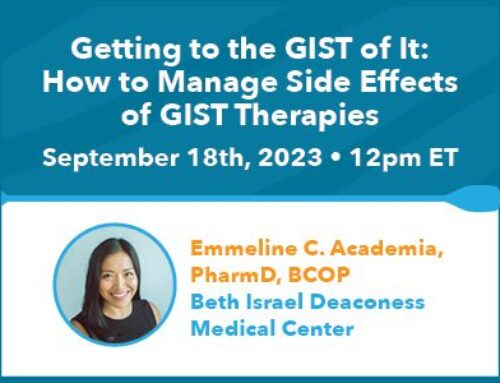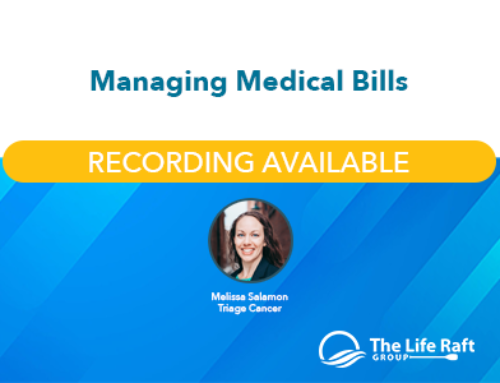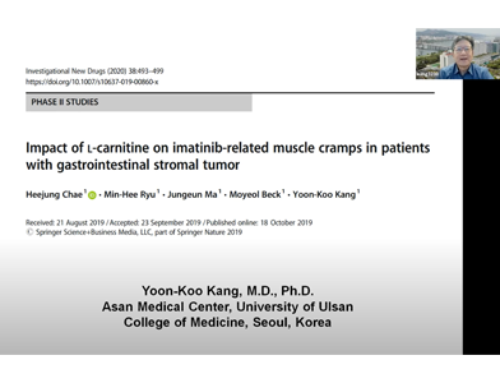When to seek immediate help for emotional issues.
If you or your loved one have any of these symptoms, notify a treatment professional or reach out to a support hotline such as the National Suicide Prevention Lifeline: 1-800-273-TALK (1-800-273-8255).
- Has suicidal thoughts or thoughts of hurting yourself
- Lacks interest in activities that normally give you pleasure most days
- Is unable to sleep or sleeps excessively
- Experiences strong emotional states that interfere with daily activities
- Experiences severe fatigue or loss of energy
- Experiences mental confusion or a diminished ability to think or concentrate
- Displays unusual symptoms that cause concern
Emotional Side Effects
A cancer diagnosis has a significant impact on patients, caregivers and their families. It is normal for someone diagnosed with GIST to feel a whole host of emotions ranging from anger to fear, sadness and anxiety about the future. It is important, however, to be able to differentiate between the normal range of emotions and clinical symptoms of depression and anxiety, which require swift intervention.
Sharing with your medical team is the first step to differentiating your emotional side effects and in discerning the best ways and tools to manage them. The Life Raft Group Patient Registry Department is a great source for information on side effects and other treatment issues.
Depression
Depression is different from sadness. It is normal to feel sadness and grief about a cancer diagnosis. Depression is a clinically diagnosed disorder with specific criteria. Approximately one in four cancer patients become depressed. (NIH, National Cancer Institute)
Major Depressive Disorder, or Major Depression, according to the Diagnostic & Statistical Manual of Mental Disorders V includes the following signs and symptoms:
- Prolonged sadness or unexplained crying spells
- Significant changes in appetite and sleep patterns
- Irritability, anger, worry, agitation, anxiety
- Pessimism, indifference
- Loss of energy, persistent lethargy
- Feelings of guilt, worthlessness
- Inability to concentrate, indecisiveness
- Inability to take pleasure in former interests, social withdrawal
- Unexplained aches and pains
- Recurring thoughts of death or suicide
A cancer patient has additional risks for depression which can include the following:
- Learning you have cancer when you are already depressed for other reasons
- Having cancer pain that is not well controlled
- Being physically weakened by the cancer
- Taking certain kinds of medicines such as:
- Cortosteroids
- Procarazine
- L-asparaginase
- Interferon alfa
- Interleukin-2
- Amphotericine B
Other factors that can contribute to depression may include:
- A personal history of depression or suicide
- A family history of depression
- A personal history of alcoholism or drug abuse
- Stress caused by life events other than the cancer
- Additional health problems known to cause depression (i.e., heart attack or stroke)
- A weak social support system
Medical conditions other than cancer can cause depression.
- Chronic pain
- Anemia
- Fever
- Abnormal levels of calcium, sodium or potassium in the blood
- Not enough vitamin B12 or folate in your diet
- Too much or too little thyroid hormone
- Too little adrenal hormone
- Side effects of certain medications
Coping with Depression from GIST
If you are displaying symptoms of depression, remember that it is treatable. Consulting with a mental health professional or sharing your symptoms with your cancer care medical team is a critical first step, to determine if you are clinically depressed or experiencing situational depression due to your cancer diagnosis or other factors.
Anxiety
If you or your loved one experiences one or more of these symptoms, please seek help from a treatment professional or call a support hotline.
- Shortness of breath or a feeling of being smothered*
- Racing heart*
- Feeling of lightheadedness, feeling faint or dizzy*
- Chest pain or discomfort*
- Feeling of choking*
- Excessive trembling or shaking
- Sweating
- Fear of losing control
- Urges to escape
- Numbness or tingling sensations
- Feeling “unreal” or detached from themselves
- Chills or hot flashes
These may be signs of a panic attack. Symptoms marked with an asterisk * can mean an urgent, life threatening situation requiring immediate medical attention. Call 911 or a doctor if someone has these symptoms unexpectedly, as the can be signs of more serious issues. (American Cancer Society)
Cancer patients may experience feelings of fear and anxiety in response to their diagnosis and treatment. It is a normal response to the uncertainty that the situation brings. These symptoms may also be experienced by family and friends.
As with depression, there is a difference between normal situational anxiety about your disease and treatment, and clinically diagnosed anxiety disorders.
The Diagnostic and Statistical Manual of Mental Disorders, or DSM-5 indicates the criteria for Generalized Anxiety Disorder includes:
- The presence of excessive anxiety and worry about a variety of topics, events or activities. Worry occurs more often than not for at least 6 months and is clearly excessive.
- The worry is experienced as very challenging to control
- The anxiety and worry is associated with at least three of the following physical or cognitive symptoms
- Edginess or restlessness
- Tiring easily; more fatigued than usual
- Impaired concentration or feeling as though the mind goes blank
- Irritability (which may or may not be observable to others
- Increased muscle aches or soreness
- Difficulty sleeping (due to trouble falling asleep or staying asleep, restlessness at night, or unsatisfying sleep)
Many individuals with Generalized Anxiety Disorder also experience symptoms such as nausea, sweating or diarrhea.
- The anxiety, worry or associated symptoms make it hard to carry out day-to-day activities and responsibilities. The may cause problems in relationships, at work or in other important areas.
- These symptoms are unrelated to any other medical conditions and cannot be explained by the effect of substances including a prescription medication, alcohol or recreational drugs
- These symptoms are not better explained by a different medical disorder For patients experiencing anxiety, it is important to share your symptoms with a member of your medical team. Remember that anxiety is a treatable condition. It is important to be evaluated by a qualified professional who is knowledgeable about these symptoms. Your physician may prescribe anti-anxiety medication.
For both mild anxiety and depression, there are interventions which can help to reduce symptoms:
- Increase your physical exercise as you are able. When you exercise, your body releases endorphins, chemicals that interact with receptors in your brain that trigger positive feelings in the body.
- Join a support group. Normalizing your experiences and sharing strategies with others often aids in reducing depression. The LRG has a closed, secure email community where patients and caregivers can share their experiences. The LRG also had local groups all over the world that meet face-to-face. Organizations like CancerCare (http://www.cancercare.org/support_groups) and the American Cancer Society (http://www.cancer.org/treatment/supportprogramsservices/index) also are good places to look for local support groups.
- Use meditation, prayer or other types of spiritual support.
- Try some integrative therapies that can help to reduce symptoms such as breathing and relaxation exercises, or yoga.
- Be sure not to hold your feelings inside. Talk to a treatment professional, clergy or other trusted advisor.
- Maintain a healthy lifestyle that includes a healthy diet, sufficient rest and mild exercise. – Do not isolate yourself. Be sure to maintain a social network. Socially connected patients report a better quality of life.
- Do not rule out medication if recommended by your treatment professional. Biochemical interventions can often make a dramatic difference in the ability to cope with depression.
- Remember that there is no shame in experiencing difficult emotions.
References:
American Cancer Society. Anxiety, Fear and Depression, Having Cancer Affects Your Emotional Health. www.cancer.org/treatment/treatmentandsideeffects/emotionalsideeffects/anxiety-fear-depression-and-cancer
American Psychiatric Association.Diagnostic and Statistical manual of Mental Disorders. Fifth Edition. American Psychiatric Association, Arlington, VA. 2013 National Cancer Institute. www.cancer.gov/about-cancer/coping/feelings/depression-pdq
American Foundation for Suicide Prevention.
https://afsp.org/our-work/education/talk-saves-lives-introduction-suicide-prevention/?gclid=EAIaIQobChMI9drQsOT_4AIVR18NCh18VgO2EAAYASAAEgIKBvD_BwE





